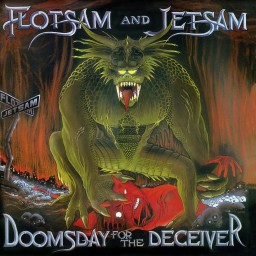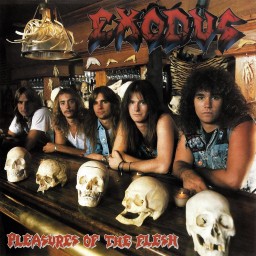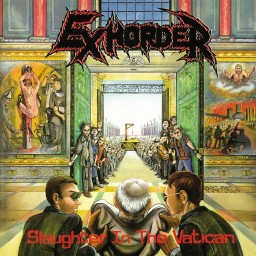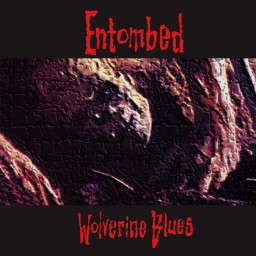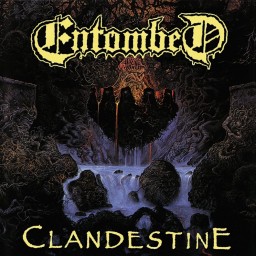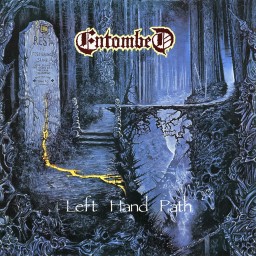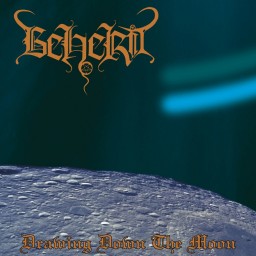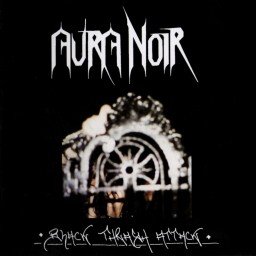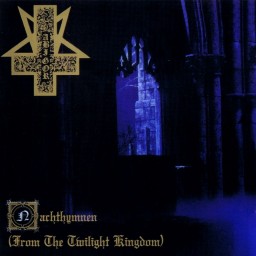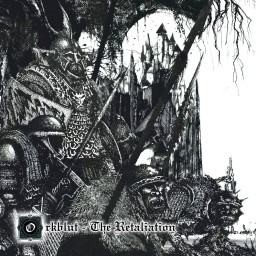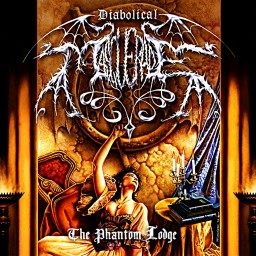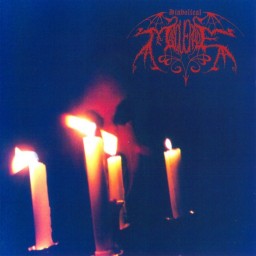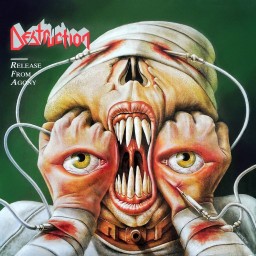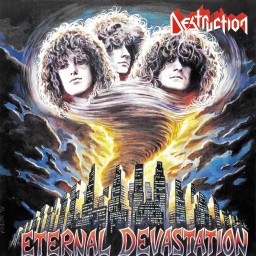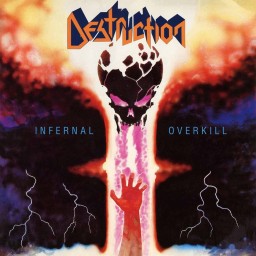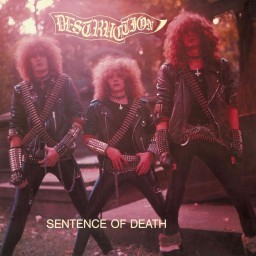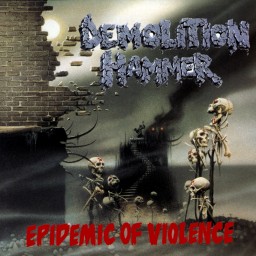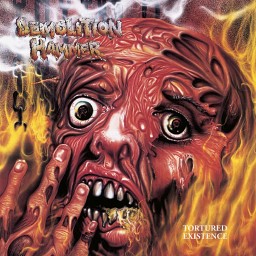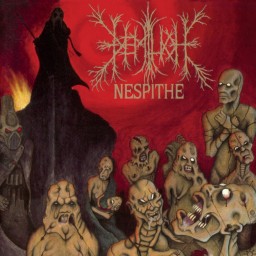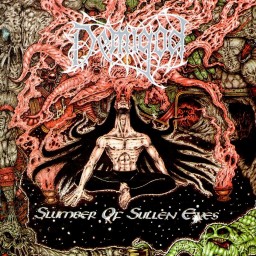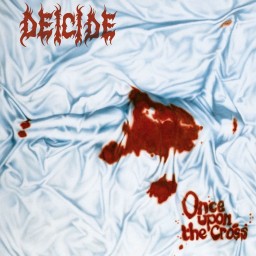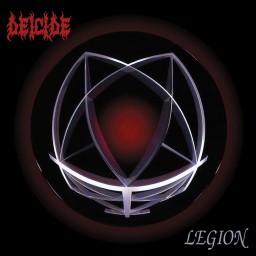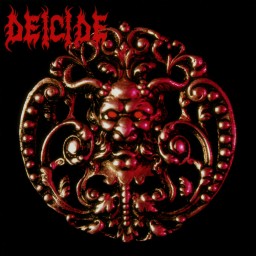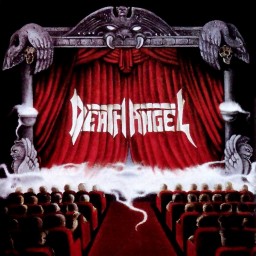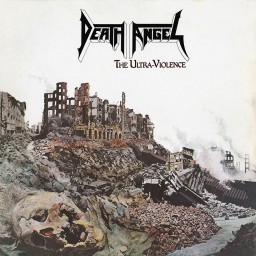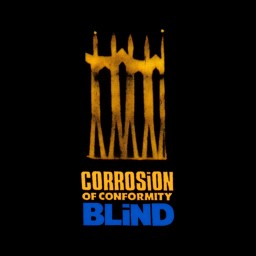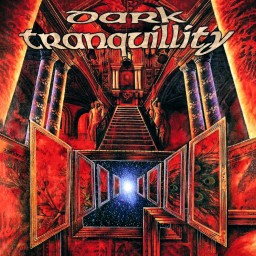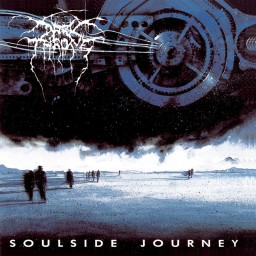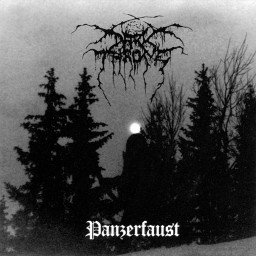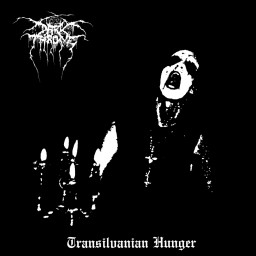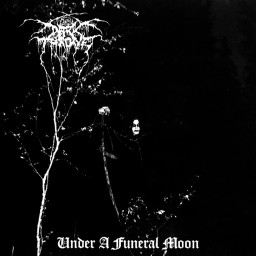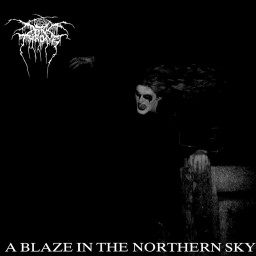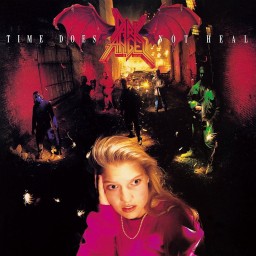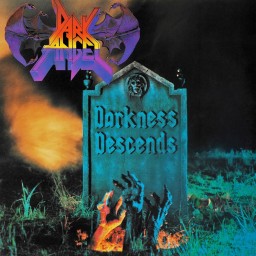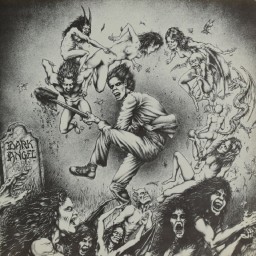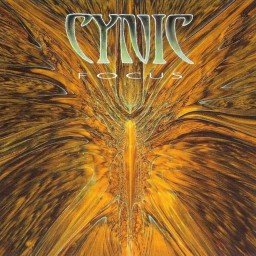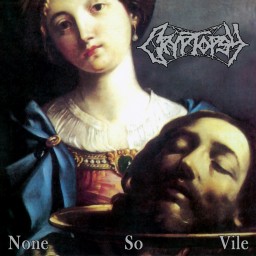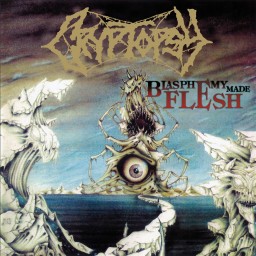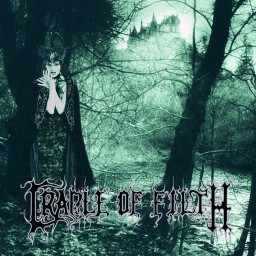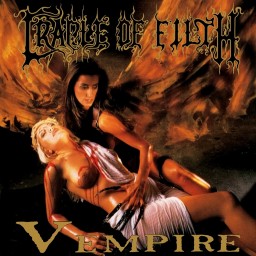Ben's Reviews
First impressions for this album aren't great. To be honest, Flotsam and Jetsam is a stupid name for a band. And the artwork on this sucker is truly atrocious. But never being one to judge a book by its cover, I thought I'd give this renowned album a fair go.
While this is thrash metal, it's more on the softer, melodic side of things (think Anthrax), rather than the more venomous (think Kreator). With a vocalist that sounds classically heavy metal and a tendency to play long tracks, I must admit this isn't completely my thing. There are some decent riffs on here and the drumming is tight enough. I just don't find myself wanting to come back for more. I've listened to it a handful of times and can't find any outstanding tracks. Nor can I find any bad ones. I'm going to give it a generous 3.
Genres: Speed Metal Thrash Metal
Format: Album
Year: 1986
Bonded by Blood has always been raved about as a cult classic. In my opinion, it's decent enough but way overrated. Baloff’s vocals annoyed me immensely. Second album Pleasures of the Flesh is a different release. Souza's vocals are much more listenable, but then the ferocity of the first album has been replaced with a more clinical thrash metal approach.
But while I prefer this sound to the debut, it's lacking on the song writing front. There's just nothing exceptional on here and it's a bit hit and miss. Til Death Do Us Part, Parasite, Brain Dead and the title track are all enjoyable tracks. The rest are just average. Every track has its moments but as an album Pleasures of the Flesh just doesn't keep bringing me back for more.
Genres: Thrash Metal
Format: Album
Year: 1987
Exhorder will always be remembered for having a vocalist that sounded exactly like Phil Anselmo and a similar sound to boot. Whether or not Pantera copied Exhorder or vice versa has been an endless argument without any real resolution. The fact of the matter is that both bands released their debut thrash metal albums in 1990 and both albums are well worth picking up. Only one of the two bands went on to massive things, but that’s due to Pantera’s commercial attractiveness and variety rather than any lack of quality on Exhorder’s part.
Slaughter in the Vatican is brutal thrash metal that pulls no punches. With a fantastic production that really lets their aggressive sound smash the listener to a pulp, it’s not surprising that these guys didn’t make their way into the mainstream the way Pantera did, despite the similarities. Chris Nail’s drumming is relentless and awesome. Vinnie and Jay’s riffs were groove-laden yet crushing. Kyle Thomas’s vocals may not have had the range of Anselmo’s, but his aggressive growl is just as awesome.
Homicide (check out how much this sounds like Deicide!), The Tragic Period and Legions of Death are the highlights on a solid, heavy thrash metal album that deserves a place in any thrash metal collection. Try to get your hands on the limited (to 2000) remastered digipak from Metal Mind.
Genres: Thrash Metal
Format: Album
Year: 1990
Disappointing album that just makes me want to listen to their old stuff.
Wolverine Blues must be the first significant example of the genre death 'n' roll and I can't say I'm a huge fan. Their first two albums were fantastic, pioneering death metal albums that along with a bunch of other bands (such as Unleashed, Carnage and Dismember), kicked off the whole Stockholm sound. Whereas Dismember and Unleashed relentlessly continued on with the sound they'd formed, Entombed decided to take a detour.
Strangely, considering how different the album is to their former work, you can tell it's Entombed straight away. The dirty riffs are still there but they're a lot less ferocious and the leads could be straight out of a 70s "metal" band. The vocals lost a little bit of the death growl and are now more of a grunty shout. But the main difference musically is the drumming. It now resembles plain old rock and roll drumming a lot of the time and I have to say that it takes a lot of the power out of the bands effect.
So obviously Wolverine Blues disappoints me, but I guess it's not terrible. The band know how to write good riffs and there are plenty on this album. Eyemaster, Rotten Soil and the title track get things underway quite well, but then tracks like Full of Hell and Blood Song are quite simplistic and boring. I'm just not left with any real desire to listen to the album again once it finishes. Then again, maybe this sound is just not my thing, so I'll give it a generous three stars.
Genres: Death Metal
Format: Album
Year: 1993
This is my favourite Entombed album. In fact, I'd have to say that out of all the albums in this style (i.e. Swedish death metal), Clandestine is probably the one I enjoy the most. Their debut Left Hand Path was a good album that unleashed (excuse the pun) "that sound" to the world. But while the album was hugely influential (Dismember, Grave and Unleashed would all use the same sound within 12 months), it tended to lack variety and by the end, the tracks started to merge together. Clandestine contains a similar sound to the debut, although the production has more clarity in general. But more importantly, this classic release is a fair bit more consistent than Left Hand Path, with a whole bunch of cracking tracks throughout.
First and foremost, Sinners Bleed is one of my very favourite tracks by any band. When that riff kicks in just after the minute mark, Entombed are at their absolute peak! Living Dead, Blessed Be, Stranger Aeons and Chaos Breed are all fantastic, but then there isn't any filler material on this album. Once again, Dan Seagrave's cover artwork is superb, shrouding the album with menace and mystery before you even press play. I can't blame Entombed for going off and doing something a bit different after this album, as there were so many imitators coming out of the woodwork. But unfortunately, they'd never reach these heights again.
Genres: Death Metal
Format: Album
Year: 1991
Entombed unleashed an extremely dirty, yet captivating sound with Left Hand Path. What's now considered to be the Swedish death metal sound was pretty much created right here. Others would follow including Dismember, Grave and Carnage. Pummelling mid paced drums, deep yet decipherable guttural vocals, grooving bass and that filthy guitar sound combine to give quality tunes a feeling of brutality and abundant power.
There are some really great tracks on Left Hand Path including the classic opener Left Hand Path, Drowned, Revel in Flesh, Supposed to Rot, Morbid Devourment and Premature Autopsy, but as many have mentioned below, a lot of these tracks start to blend into one by the second half of the album. But Entombed obviously set out to utilize this sound to create a massive unrelenting album and that's exactly what it is. I also love the album cover which is extremely dark, eye catching and cool. Clandestine would be a better album than this one, but there's no denying how important and enjoyable Left Hand Path was and is.
Genres: Death Metal
Format: Album
Year: 1990
It's hard not to get excited about listening to an album so highly rated in a genre you adore. I couldn't wait to get my hands on it and delve into its supposed darkness. To say that I'm a tad disappointed is an understatement. Drawing Down the Moon is so bad that I thought I must be listening to the wrong album. Or perhaps statements below like "most evil and hauntingly ritualistic album I've ever heard" had given me expectations that could never be met. Or maybe, this is just average, terribly produced, ridiculously overrated black metal that doesn't come remotely close to bands like Burzum, Darkthrone or even Xasthur when it comes to raw, atmospheric, evil sounding black metal. I think probably it's the latter.
The production is always crap on these sorts of albums, but in this case it really is dodgy. The drum sound is quite upfront and bassy yet the riffs are completely thin and powerless, not to mention utterly simplistic and lifeless. The vocals seem completely out of place, like they're from a totally different recording and just stuck on top. Nuclear Holocausto's (yes, seriously) lame attempt at pure evilness fails entirely no matter whether he's speaking, growling or screaming. Tracks such as The Gate of Nanna and Summerlands are clearly supposed to get the hackles on my neck rising, but instead they have me cringing in disbelief. Down There... and Thou Angel of Gods are so simplistic, an 8-year-old (freaky 8-year-old admittedly) could have written them. Oh well, I guess Rate Your Music can't really be wrong, as it's based on fan opinions. But I just don't get this one and I'd love to hear from anyone out there that can explain to me why this album deserves to be considered a classic black metal album. If I had to pick highlights, I'd say Nocturnal Evil (which is not too bad) and Werewolf, Semen and Blood.
Genres: Black Metal
Format: Album
Year: 1993
Early thrash metal worship performed by black metal musicians. Seriously cult!
Aura Noir started out as the brainchild of Carl-Michael Eide (aka Aggressor). While he was already involved in other bands including the fantastically unique Ved Buens Ende, he clearly had an itch that needed scratching. With the help of his friend Ole Jørgen Moe (aka Apollyon), who was part of Dodheimsgard at the time, he began writing old school thrash material dedicated to the heroes of his youth (the likes of Kreator, Destruction, Slayer and Dark Angel). They unleashed a rather primitive EP (not surprising considering the band recorded it in 5 hours after breaking into the recording studio their mate used to work at) in 1995 entitled Dreams Like Deserts. One thing of note on this early recording is the fact that Aggressor and Apollyon switch instruments for each successive track. While one performs drums, the other handles guitars and vocals. They’d continue to work this way in the future, including on their aptly named debut full length Black Thrash Attack. It’s certainly one of the first examples of a band taking black metal back to its original thrash roots and along with bands such as Deströyer 666, one of the best.
This time around though, they recruited Mayhem guitarist Rune Eriksen (aka Blasphemer) to form a band of truly destructive proportions. Surprisingly, considering their earlier undercover effort, Black Thrash Attack was recorded in the same studio as Dreams Like Deserts, but it wasn’t always supposed to be that way. Aggressor and Apollyon had already recorded several of these tracks at a different studio, but they were so unhappy with the drum sound (which had been messed up by none other than Maniac from Mayhem!) that they decided to start from scratch. Good thing they did too as not only is the sound perfectly adequate (it still could be better, but it works for this style), but the addition of Blasphemer adds an extra dimension to the band. Not many fans seem to have caught onto the fact that Aggressor performs guitars, bass and vocals on tracks 1, 3, 5, 7 and 9 (with Apollyon on drums), while Apollyon does the same for tracks 2, 4, 6, 8 and 10 (with Aggressor on drums). It’s not really the sort of thing you listen for, but once you know, it becomes blaringly obvious and gives the album diversity despite any similarities in the material itself.
While both performers clearly bring elements of black metal to all the thrashing glory, they do so in vastly different ways. For example, Apollyon’s drumming is performed in an old school thrash style, while Aggressor blasts away like a black metal drummer regularly, meaning his tracks have a more extreme edge. Both change their own vocal styles up meaning it’s not always as obvious who you’re listening to, but this time it’s Apollyon who extends his venomous snarl into a full-throated black metal shriek. The above diversity results in the even numbered tracks on the album having more of a black metal spirit than the odd. The riffs are gold throughout no matter which performer is playing them, but occasionally the guys push the blatant worship too far (The One Who Smite has a riff plagiarized from Slayer). Plus, I’m sure the cult status of the album was assured without the need for the vocalist to holler the name of a band member before a drum blasting section (“Apollyon…destroy!”) or a guitar lead, but it’s all just part of the fun. You simply can’t listen to tracks such as Conqueror and Fighting for Hell without raising your devil horns in respect.
Genres: Black Metal Thrash Metal
Format: Album
Year: 1996
Abigor created some truly unique and brilliant black metal albums and Nachthymnen is no exception.
After Orkblut completely destroyed me (in the best possible way), I was looking forward to a follow-up a heck of a lot. I didn't have to wait long as Nachthymnen came out just a few months later. I think at first, I was a little disappointed that Abigor had made a more straight up black metal album after Orkblut had contained so many wonderful little interludes and a whole plethora of medieval instrumentation. But it didn't take me long to realise that the band had lost none of their creativity and had instead managed to mix a lot of this ingenuity into the black metal itself, allowing for a far more seamless experience that would reveal more and more on every listen.
The production went up a notch with the blast beats having a lot more punch than on previous Abigor outings. In fact, Thomas is an outstanding drummer that never gets enough praise and he somehow manages to perform some of the guitar for the album as well (one assumes not at the same time). Peter's riffs and melodies always contain a strange and unique element that I love, and this album has some truly beautiful work indeed. The way he mixes acoustic guitar into the opening track is breathtaking to say the least! Silenius' vocals are great as usual. He sounds unlike anyone else in the scene and somehow his style is perfect for both the intense black metal of Abigor and the more bombastic, symphonic musings of Summoning.
Yet despite getting over my initial disappointment and finding another great release by these Austrians, I must admit that Nachthymnen is by no means perfect. The female vocals are a nice addition but are unfortunately a bit hit and miss, and a couple of the tracks towards the end don't quite hold the level of brilliance displayed early on. But Abigor were certainly one of the most exciting bands in extreme metal back in the mid-nineties, and while they couldn't keep this high standard going for very long, no fan of black metal should be without their first few albums. Highlight tracks are Unleashed Axe Age, Scars in the Landscape of God, Dornen and Revealed Secrets of the Whispering Moon.
Genres: Black Metal
Format: Album
Year: 1995
A breathtaking journey that combines ambient, folk and blistering black metal. Abigor's finest moment!
Orkblut - The Retaliation was the first Abigor album I purchased way back in 1995 and I think it’s probably my favourite. This Austrian band has gone through various stages over the years, but all their finest releases came about in the mid to late 90s. There was something truly epic and captivating about their sound throughout this period and the band put far more effort into their work than they would on a few of the later, less than excellent recordings. Orkblut has a running time of under 25 minutes and there has been some confusion as to whether this should be considered an album or an EP. I will always consider it to be an album, as it contains 11 tracks that combine into one extremely complete and satisfying result. But who cares about such minor details? The fact is that Abigor released an immensely entertaining album with Orkblut and it’s one that I go back to repeatedly.
Orkblut is a unique experience in many ways. It tells the story of a warrior in battle and every track encompasses an appropriate mood that follows the steps of his journey. This is effectively done by splitting the album up into varied styles including blistering black metal, ambient sections and medieval folk. What this means is that there are only 4 full black metal tracks to be found, with the rest acting as intros, interludes and outros. This may all sound a bit gimmicky but while it’s certainly not a seamless experience (some of the transitions are clunky to say the least), it is always a captivating and exciting one. It’s the type of album that is meant to be listened to in its entirety rather than track by track which is where the short running time works in its favour.
The black metal tracks are awesome with The Rising of Our Tribe and Emptiness / Menschenfeind / Untamed Devastation being of note. You really do get the sense that a battle is taking place during these tracks and the war drums that appear regularly are a genius addition. In f act, Thomas’ drumming is just sensational throughout with flawless blast beats and fills flying everywhere. Silenius’ immediately distinguishable vocals are fantastic as usual and Peter (he really needed a cooler name!) seems to have an endless source of cracking riffs to choose from. The keyboard driven ambient sections work well, which isn’t surprising when you consider they were performed by Rune (aka Tharen) who would later go on to form Dargaard. There really isn’t much negative to say here other than the fact that the album is over so damn quickly when I want it to go forever. Then again, every battle ends eventually.
Genres: Black Metal
Format: EP
Year: 1995
Heavy metal shenanigans dilute what is otherwise excellent theatrical black metal.
I’d been enormously eager to get my hands on this album back in 1997. Diabolical Masquerade’s debut album Ravendusk in My Heart was brilliant, with Blakkheim’s mixture of black and more traditional metal really striking a chord with me. It’s interesting to note that when he created that first album, there was no certainty regarding the future of his main band Katatonia. With the band put on hold in 1995 due to some internal disagreements, Jonas Renkse went off to start October Tide with Fred Norrman and recorded Rain Without End the same year (it wouldn’t be released until 1997). Given the opportunity to do something a bit different, Blakkheim decided he would take a more extreme approach, leaving the realms of death doom metal temporarily to try his hand at black metal. Yet one gets the feeling when listening to Ravendusk in My Heart that it was far more than simply a side project to keep the man busy for a time. While there’s no doubt Blakkheim used Diabolical Masquerade as a chance to broaden his musical output and to experiment with a totally different sound, he kept the flamboyant creativity in check to produce a consistent, entrancing album.
By the time 1997 came around, Katatonia had regrouped to record their best album to date with Brave Murder Day, which was met with both fan and critical praise. With the future of that outfit assured, Blakkheim went about crafting a Diabolical Masquerade sequel. The result is on paper not particularly different to the debut, with cleanly produced symphonic backed black metal mixed with thrash and heavy metal influences, all wrapped up in the same grand bizarre carnival-like atmosphere. The faster sections are once again fantastic with symphonic driven riffs, heavy double bass kicking drums and venomous vocals taking the listener on a thrilling musical journey. Dan Swanö had far less input on The Phantom Lodge than the previous album, acting as producer rather than a musician, which means Blakkheim handles guitars, bass, keyboards and vocals almost singlehandedly (Swanö contributes guest vocals and Ingmar Döhn a bass solo). The use of flutes (performed by Tina Sahlstedt and Marie Gaard Engberg) and keyboards really add to the atmosphere too and stacks of little variations throughout mean you never quite know what’s around the corner. It’s a very interesting listen and when at its best, comes close to matching the incredible debut.
Unfortunately, signs that Blakkheim had begun to see Diabolical Masquerade as nothing more than a side project to his main event had begun to surface. The restraint that he displayed on the first album had been replaced by a rather uninhibited flamboyance, with most tracks swinging wildly between the above mentioned superb black metal and awkwardly out of place theatrics. Even the best tracks on the album (The Puzzling Constellation of a Deathrune and The Walk of the Hunchbacked) have sections of traditional metal, which while not terrible, break up the atmosphere in unnecessary ways. In the worst cases (Hater and Upon the Salty Wall of the Broody Gargoyle), Blackkheim simply gives into the urge and goes ridiculously over the top. Hater contains very simplistic thrash metal riffs complete with Swanö’s heavy metal squeals and is quite frankly terrible. Upon the Salty Wall of the Broody Gargoyle follows a similar path with a swinging, repetitive chorus, but at least breaks up the shenanigans with some nice atmospheric sections. These moments don’t entirely ruin The Phantom Lodge, but they do succeed in making it a far less enjoyable album than Ravendusk in My Heart. A disappointing album, but still a decent one!
Genres: Black Metal
Format: Album
Year: 1997
A unique mix of black and traditional metal. Blakkheim's adventurous fantasy is a trip worth taking.
Diabolical Masquerade was really the magnificent black metal playground of the infamous Blakkheim (also known as Anders Nyström of Katatonia fame). He handled the songwriting plus all guitars, vocals and a fair amount of the keyboards on every release, so it was really his baby. Bandwhore Dan Swano was also involved in various ways through all four albums but it was never particularly clear exactly how much input he had in the creation of each, instead taking on a producing role and guesting here and there. The band are far better known for the Nightwork and Death's Design albums that they'd release a few years after this debut, but it would be a tragedy for anyone out there to assume the earlier albums weren't worth checking out, particularly the wonderful Ravendusk in My Heart.
I was as surprised as anyone when I first heard the album at the time of its release as it's so far removed from the emotional death doom of early Katatonia. Yet clearly Anders was a big fan of black metal and felt he had something to offer to the genre. I'm damn glad he gave in to the urge as this album has always been a treasure to me. It has an extremely unique atmosphere that's built upon fast paced majestic black metal with more traditional heavy metal. One can't help but be swept away with the bizarre fantasy which is more than assisted by the strange track titles and lyrics. The production has a lot of clarity to it rather than the brutally raw sound that is often associated with black metal but it works perfectly for the world Blakkheim so passionately created.
As much as I hate to admit it, the album has its flaws. It's tremendously adventurous throughout so it's not at all surprising that it doesn't always hit the mark. A few tracks break into traditional metal riffs randomly and while these are cool enough on their own, they tend to draw the listener out of the mood that had been building up so successfully. Under the Banner of the Sentinel is the worst offender in which Blakkheim even dares Judas Priest imitating high pitched vocals. But these odd shifts in tone can't take away from what is a unique, inspired piece of work that I reach for often when wanting for something a bit different to the norm. Highlight tracks for me are Blackheim's Quest to Bring Back the Stolen Autumn, The Sphere in Blackheim's Shrine, Blackheim's Forest Kept the Season Forever and Blackheim's Hunt For Nocturnal Grace.
Genres: Black Metal
Format: Album
Year: 1996
I seem to be a minority in my general disinterest in Destruction's early work. Many consider their first few releases to be classic thrash metal albums. I've tried over the years to get into them, but simply can't see any reason why so many metal fans rate them so highly. Neither Infernal Overkill nor Eternal Devastation were particularly bad albums, they just offered nothing very exciting and nothing beyond plain, average thrash.
So, I started listening to Release From Agony, their third full length album, with a certain level of pessimism, particularly as it doesn't receive as much praise as the above mentioned releases. Surprisingly, this is a fair improvement on everything the band did before it. Finally, they have a decent production that doesn't leave the whole band sounding wimpy, and there's also much more variety and musical experimentation to be found throughout the eight tracks included than could previously be heard. Sign of Fear is an example of what Destruction can do if they put their mind to it, with its eerie keyboard and acoustic guitar work adding to the normal metal blueprint. Release From Agony, Unconscious Ruins and Incriminated are really enjoyable also, but there are great riffs at pretty much every turn.
The problem is that when compared to other European thrash bands such as Kreator and Sodom, Destruction just don't reach the same level of excitement. Schmier's vocals, while better on this album, still annoy me somewhat. His almost embarrassing high-pitched squeals are not as prevalent than they were previously, but still raise their ugly head from time to time. I must admit that I occasionally enjoy his performance this time round. The solos are fairly rubbish at times, while OK at others. And finishing the album with that stupid little piece of music is completely out of character with the rest of the sound and well, just plain dumb. I enjoy Release From Agony more than anything other Destruction album I've heard, but it's still no classic.
Genres: Thrash Metal
Format: Album
Year: 1987
Just as with the debut album, I find Destruction to be highly overrated. This album has only ok production, messy musicianship, and the vocals are at times terrible. The squeals that Marcel Schirmer comes out with throughout the album are cringeworthy to say the least. It's such a shame, because there are some decent riffs on here, but they are sporadic, and always surrounding by average ones.
I know Destruction have a lot of fans and I realise I’m in the minority, but I just don't like this all that much. If I compare it to other albums released in the same year such as Master of Puppets, Reign in Blood, Peace Sells, Darkness Descends etc. this just pales into insignificance.
Genres: Thrash Metal
Format: Album
Year: 1986
I know there are a lot of fans of this album, but I find it less than convincing. At times it is messy to say the least, but the main issue I have with it is the total lack of urgency and aggression that normally comes with great thrash metal. When they get it right, it's affective enough, with The Ritual and Bestial Invasion being the highlights for me. But too many times I find myself just losing interest as the album passes by harmlessly, only catching my attention when another clunky solo draws my awareness back in the worst way possible.
There are some decent riffs here and there, but overall this album is overrated.
Genres: Thrash Metal
Format: Album
Year: 1985
I must admit that I didn't really enjoy Destruction's so-called classic albums. Neither Infernal Overkill nor Eternal Devastation did much for me and I think they're both overrated. So, when I first checked Sentence of Death out, I assumed I would hate it. That hasn't turned out to be true and in fact I enjoy it more than the full-length albums.
The first thing to note is that while the production isn't great, it has far more impact than either of the previously mentioned albums do, which seriously lacked any sort of grunt. Marcel's vocals are also less annoying on these tracks, specifically not reverting to that terrible squeal as much that pops up often in their music.
I'm still not going to rate it very highly as it only has 5 tracks, lasting under 20 minutes. And while Mad Butcher is certainly memorable, and Satan's Vengeance is decent, none of the other tracks make me want to come back for more.
Genres: Thrash Metal
Format: EP
Year: 1984
I only recently picked up Demolition Hammer's debut album Tortured Existence and found it to be an entertaining underground thrash metal album. But it's obvious from the rating above that Epidemic of Violence is considered by many to be one of the very best albums the genre has to offer. After just a few minutes it's easy to hear why! This is intense, thrashing madness that manages to combine great musicianship with venomous aggression. Think Slayer and Kreator with machine gun drumming and brutal vocals, all at incredible face ripping velocity.
The production isn't amazing but it's punchy enough for all this metallic angst to hit home. The riffs are quite special throughout and the band's ability to shift gear successfully at exactly the right time stops any of the 8 tracks (Orgy of Destruction is a short instrumental) from getting even slightly boring. For a perfect example, check out opener Skull Fracturing Nightmare and tell me you're not banging your head madly around the 2-minute mark. Once again Steve Reynolds vocals are awesome! He really does remind me of Mille from Kreator, yet he manages to top even that veteran for pure animosity. Vinny Daze on drums is an absolute machine and he certainly gives Epidemic of Violence an almost death metal intensity.
Highlights are aplenty but my personal favourites would be Skull Fracturing Nightmare, Pyroclastic Annihilation, Omnivore and Aborticide. This album deserves all the praise it gets and I'm quite surprised that it hasn't been recommended to me more frequently over the years. Don't make the same mistake I did by ignoring this thrash metal gem for over 15 years. If you like thrash metal in the slightest, you just got to own this!
Genres: Thrash Metal
Format: Album
Year: 1992
Even ignoring the insanely bad artwork, I really didn't expect to like this much. It's hyper intense thrash metal with a hardcore edge and that's normally a bad combination in my book. But this is just too good not to enjoy. The band sound at times like an extremely pissed off Kreator mixed with Exhorder, with decent musicianship and production to go with it. The riffs are constantly exciting throughout, the drumming is rapid fire destruction, the vocals are venomous to the max and the leads are surprisingly good, which all adds up to an entertaining debut release by these US thrashers.
While Steve Reynolds vocals are on the hardcore side, they're one of the album's strengths. His ability to create memorable structures out of completely juvenile lyrics combined with all the immensely inspired thrash riffage totally make this album worth tracking down. Demolition Hammer are one of those bands that seemed to remain completely underground, even though they were better than a lot of other more popular bands (yes, I'm looking at you Exodus). Hopefully, sites like Rate Your Music will take their thrashing madness to a much larger audience, albeit somewhat late in the day. Highlight tracks for me are .44 Caliber Brain Surgery, Neanderthal, Crippling Velocity and Cataclysm but it's all solid.
Genres: Thrash Metal
Format: Album
Year: 1990
Unique and fascinating album with vocals the must be heard to be believed.
This is such a unique album! In the realms of death metal, where there are strict rules and boundaries, it is extremely rare to find an album that sounds like no other. Demilich appeared, released one bizarre yet captivating album, and then seemingly disappeared off the face of the planet. In fact, it wouldn't surprise me in the slightest to find out that the band were only visiting Earth when they decided to record this album before shipping off back to whatever galaxy they came from. After all, those vocals are surely not human! They're so incredibly low and guttural that I just can't imagine them emitting from a mere man's vocal chords. As many have mentioned below, they do take some getting used to, but once you get past the amusement factor, they really do suit these strange and wonderful riffs perfectly.
The whole album has a kind of alien feel to it. The cover is truly creepy, the song titles and lyrics are completely bizarre (The Planet That Once Used to Absorb Flesh in Order to Achieve Divinity and Immortality anyone?). I find it really refreshing that a band cannot take themselves too seriously, and yet still spend the time creating such a complete package. Most tracks contain violently shifting riffs that while making a lot of the album sound very similar, are always entirely captivating. I'd like to give Nespithe a higher score than 4 but the fact remains that I can't tell a lot of these songs apart from each other. They found a truly unique and awesome sound, but it's perhaps a bit too strange for my human mind to come to grips with at times. The album deserves all the praise it gets for, at the very least, not being afraid to take their own path. I hope Demilich are still having this much fun wherever they are situated in the universe today.
Genres: Death Metal
Format: Album
Year: 1993
Demigod have always been a bit of an underground band, never really taking off the way other Scandinavian death metal bands did back in the early 90s. Heavily influenced by their Swedish neighbours, these Finnish youngsters created one very decent and atmospheric album and then disappeared for many years. But the album they left us with is certainly worth checking out, and it's sound is unique enough to make it stand out from all the other classic releases from this hugely diluted period.
The main difference between Demigod and the likes of Dismember and Entombed, is that Demigod change up their speed much more successfully. They may not ever reach the excitement level of those bands, but when they take things down a notch, it creates a really dense atmosphere and never allows Slumber of Sullen Eyes to become boring. They also utilise these slower, more crushing sections to pull out some cool focused leads, instead of just shredding wildly up and down the fretboard.
If there is a weakness, I'd have to say that it's the rather pedestrian drumming. Too often Taatila falls back on the old one two style which sounds a bit dated these days. But the thick guitar sound and deep death growls are top notch and overall, this is an entertaining if not incredible album. It certainly deserves a bit more attention than what it has achieved over the years, but hopefully sites like Rate Your Music will bring it to the masses belatedly. It's hard to pick highlights as the album has a consistent quality throughout.
Genres: Death Metal
Format: Album
Year: 1992
A simplified Deicide that's decent enough without being much to write to Satan about.
After the obliterating album that was Legion, I sure as hell wondered how Deicide could possibly get any more furious and downright nasty. As it turned out, they didn't try. Once Upon the Cross is a more straight-forward affair that brings to mind the bands brilliant debut, but without the pure energy of youth. The riffs are designed to be crushing and memorable rather than technically jaw-dropping or anxiety inducing. Asheim's drumming is also far more simplified after the chaotic splendour that pervaded Legion's blasphemous output. My initial reaction was one of sheer disappointment back in 1995 as I guess I expected the band to raise the death metal bar with this release but listening to Once Upon the Cross today I find it to be reasonably enjoyable, if not particularly outstanding in any way.
Despite the simplified structures, the album still doesn't pull any punches. Glen's vocals are brutal throughout and the album cover and lyrics are filled with the sort of evil blasphemy that the band are known for. Yes, it's all immature stuff and won't be converting anyone sane into bloodsucking Satan worshipers, but it's Deicide, and who doesn't like a bit of Christian baiting here or there anyway. Unfortunately, the leads are no better than they were on the previous two albums, meaning crappy scales and random squeals are the order of the day. It's amazing how great the Hoffman brothers were at writing awesome death metal riffs and yet they were completely unable to learn how to produce an interesting, memorable solo after years of attempting it. Oh well, I guess we all have our limitations (unless you're Chuck Schuldiner of course may he rest in peace).
So, I've established that Once Upon the Cross has many similarities to earlier Deicide work, with all the positives and negatives that go with that statement. Yet it lacks a certain something that made their previous recordings so powerful, plus the album really nosedives towards the end, where the band appear to be merely treading water. After a cracking first half that includes the title track, Christ Denied and Kill the Christian, the second half loses steam, with tracks like To be Dead and Confessional Rape just plodding along with no real energy or passion. Unfortunately, it was a sign of things to come I guess, with the next few albums ranging from disappointing to downright ugly. Still, Once Upon the Cross has its moments and certainly doesn't overstay its welcome at only 28 minutes in length.
Genres: Death Metal
Format: Album
Year: 1995
Deicide’s debut self-titled album may have been an awesomely vicious death metal album, but with Legion these US legends tried to one up themselves. The sheer ferocity of these 8 tracks is incredible. That’s not to say this is a better album than Deicide, as I think the song writing on the debut was a fair bit superior. But if you want to get yourself completely pumped up and filled with aggression, just let loose Satan Spawn, the Caco-Daemon and go nuts.
The two main reasons why Legion is so intense are Glen Benton’s brutal vocal performance, and Steve Asheim’s inhuman drumming performance. Benton’s growls and screams are layered thick and the effect is pure evil. Asheim’s drumming is relentless, with the whole kit copping a beating seemingly simultaneously. Sure, the riffs are decent enough throughout, but I don’t love the guitar sound and it’s all a bit choppy at times. The leads as usual for Deicide are pretty rubbish too. But these tracks come at you so fast you’ll hardly have time to differentiate all that’s happening before you’re pressing play again with a filthy big grin on your face.
At around 30 minutes in length, Legion certainly doesn’t overstay its welcome. The two best moments are opener Satan Spawn, the Caco-Daemon and closer Revocate the Agitator, but everything else in between is solid intense death metal. Unfortunately, this would be the last excellent album by Deicide for around 15 years as the Hoffman brothers would drag the quality down repeatedly. It would only be when they were finally removed from the band that things would pick up somewhat.
Genres: Death Metal
Format: Album
Year: 1992
Over the years there's no denying that Deicide's output has varied in quality. Some of their albums have been fairly rubbish and the band (particularly vocalist Benton) have received a heck of a lot of criticism along the way. But there's one thing that simply cannot be taken away from them. Their debut album was brutal and thrilling death metal of the highest order. These guys played with a Satanic conviction unheard of at the time. Forget Venom with their playful Satanic piss-taking. Forget Slayer's Satanic imagery and pentagram accessories. These guys were convincingly and scarily evil! With riffs that brutally smash you to pieces, awesome drumming of a rabid animal, a vocalist that sounds like Satan himself and atmosphere to make grown men cower in the corner, Deicide's self-titled album was the business. As a 13-year-old I remember being completely infatuated with it, while at the same time feeling just a little bit dirty. It's not the sort of music you want your grandma to hear you listening to!
A lot of credit must go vocalist Glen Benton. No matter what you think of him and his crazy antics (the guy burnt an upside down cross into his forehead), his vocals are just amazing. But no less credit should go to Steve Asheim whose drumming is phenomenal throughout. He'd one up this album on Legion as well which is nothing short of stupendously impressive. Then of course the Hoffman brothers’ riffs were incredible, managing to be memorable while evilly destructive. Their leads tended to sound almost identical on each track, but they were short and sweet, not drawing attention to themselves. They're really the only downside of an otherwise incredible release.
For all the doubters out there, check out Lunatic of God's Creation, Dead by Dawn, Carnage in the Temple of the Damned and the closing masterpiece Crucifixation. Each of those tracks makes me want to run around the house smashing things up (I don't if you're wondering). If it isn't obvious, I think this album is underrated. I love my death metal, and this is one of my very favourite albums, endlessly entertaining and moving. It's a shame they lost their way after just a couple of albums. But then I guess there was only so far this form of music could be taken by one entity, and they pretty much nailed it first go.
Genres: Death Metal
Format: Album
Year: 1990
I have to say I find everyone's fascination with Death Angel's debut album The Ultra-Violence to be a bit strange. It's a fine debut, and a thrashing beast of an album. But it wasn't all that memorable and certain parts were just annoying. Act III is to me where these Filipino relatives really got their stuff together. While they certainly don't keep the musicianship in check, it's far superior to everything they released beforehand. In fact, the band really cover a wide range of styles on Act III, with several ballads, funk and rock moments complimenting the shredding. The vocalist is also much improved and manages to cross all these genre movements with style.
Seemingly Endless Time is awesome, as are Stop, Stagnant and Falling Asleep. This album is an essential album for fans of thrash metal, but particularly those ones who don't mind a little bit of experimentation and variety in their music. Good stuff!
Genres: Heavy Metal Thrash Metal
Format: Album
Year: 1990
This is a difficult album for me to review. On the one hand, it's an extremely impressive feat for a bunch of 18-year-old cousins to release something so technically awesome with so many stupendously great riffs as their debut album all the way back in 1987. On the other hand, there are a few tracks on here that I don't really rate, the vocalist can at times get a bit annoying and their tendency to muck around and just do whatever whenever stops the album from being truly memorable throughout.
But credit where credit is due, when they put their heads down and wrote music, such as with The Ultra-Violence instrumental and Voracious Souls, the results were damn good. The Ultra Violence is a cult thrash album with good reason, but I still can't listen to the whole album without losing my enthusiasm for it. A little overrated but not by much.
Genres: Thrash Metal
Format: Album
Year: 1987
Not having experienced Corrosion of Conformity before checking this album out, I really didn’t know what to expect. Being categorized as both thrash and sludge metal really doesn’t give too much away either, as I can’t think of many bands that would fit within that classification. As it turns out, I’ve found much to like about Blind, but there is also a fair amount that doesn’t really work for me. It’s an inconsistent album that is intriguing enough to get multiple listens, but not really an album I can recommend easily.
Firstly, I guess it’s worth noting that Corrosion of Conformity made a big effort to make Blind an eclectic mix of styles that is filled with variety and creativity. Unfortunately, it turned out to be a hit and miss affair that has some enjoyable tracks and some fairly average ones. The album starts off in fine fashion with the instrumental leading in to Damned For All Time perfectly. Break the Circle is another fine track, as is Mine Are the Eyes of God, with its unique, almost Middle Eastern feel. But it’s definitely Vote With a Bullet that stands out as the album highlight and I can’t help thinking I’ve heard this heavy, crushing tune before.
None of the remaining tracks do all that much for me, probably being a little less thrashy and little more rocking. I’m always leaning towards the heavier tracks on these crossover albums, so unless you’re the same way inclined, you may just find this entire album to be a winner. Worth checking out if not essential in my opinion!
Genres: Heavy Metal Sludge Metal
Format: Album
Year: 1991
Right up there with the best melodic death metal albums and Dark Tranquillity's finest.
Dark Tranquillity were one of the first bands to produce melodic death metal and they’ve been going strong ever since. They were certainly pioneering, not to mention brave, when they decided that what the normally brooding death metal genre really needed was some sweet melodies. But it proved a huge success almost immediately and has inspired some of the most commercially successful bands in extreme metal. Their style has twisted and turned over the years, but it has never ventured too far away from the subgenre they helped create. They don’t try to be overly brutal or morbid. They don’t try to be overly technical or experimental. They simply try to create entertaining, good music and rarely have they failed to do so in over 15 years. It could be said that they’re a safe band these days, but then it’s nice to have an outfit that can always be relied upon to produce the goods.
The Gallery was the first great Dark Tranquillity album. Their debut Skydancer wasn’t bad by any means, but it displayed a band still finding their feet. It was certainly a good effort considering how different it was to all death metal preceding it, but The Gallery was where they really hit their straps. This album has numerous classic tracks that will have you grinning madly in no time. The sound is big and clear which is perfect for their style and gives each musician plenty of room to show their wares. There is a stack of variety contained within the 11 tracks with the velocity ranging from almost ballad like tunes through to ripping death metal. Dark Tranquillity are just as likely to inject a piano interlude or female vocals as they are to launch into a shredding riff complete with blast beats. It makes for an always interesting and at times surprising experience that rewards multiple listens.
If the album has a flaw, it’s that the second half falls away after a near perfect start. By the time Punish My Heaven, Edenspring, The Dividing Line and The Gallery have blessed my eardrums I’m feeling like this album deserves nothing short of full marks. But then the last few tracks don’t manage to keep this high quality going in my opinion. There aren’t really any particularly bad moments, but The Emptiness From Which I Fed and …of Melancholy Burning are just not quite there on the brilliance level. But even with this downside, The Gallery is a damn fine album that should sit very snugly within any melodic death metal fans collection. I know the genre receives a lot of flak these days due to an infinite number of crappy clones, but I’d like to think that bands like Dark Tranquillity should be exempt from such criticism. The lack of quality in other bands can hardly be their fault now, can it?!
Genres: Death Metal
Format: Album
Year: 1995
I'd never given Darkthrone's debut album much of a chance until recently. It's kind of a strange first release for a band that would become famous and hugely influential for their raw black metal albums of years to come. Soulside Journey is almost completely unrelated to everything the band would ever do after its release. I guess I always assumed it would be a bit crap, otherwise why would Darkthrone completely change tact immediately afterwards. All this has turned out be incorrect though as Soulside Journey is a decent listen, and worthy of your attention, regardless of the future direction the band would take. It makes me wish they'd spent at least one more album experimenting with this sound before venturing off into darker, less structured territory.
The first thing a listener will notice is how much it sounds like Entombed and a multitude of other Swedish bands from the same era. It has that low tuned, dirty guitar sound and pummelling mid paced drums. But that's not to say that Darkthrone in death metal mode didn't have anything to offer as they certainly did. The atmosphere, technicality and song writing are all quite high and the riffs vary in speed throughout with quite a bit of this album being quite doomy alongside the death metal. The vocals are of the guttural variety and actually pretty good if not amazing. They even add a bit of keyboard for atmosphere here and there and it works well. If you enjoy early Entombed, Dismember, or any other Scandinavian death metal bands from this era, you should check Soulside Journey out. Highlights are Cromlech, Sunrise Over Locus Mortis, Soulside Journey, Neptune Towers and Eon.
Genres: Death Metal
Format: Album
Year: 1991
Panzerfaust is like a Celtic Frost worship album. It's also the beginning of the end but contains enough good material to be somewhat relevant.
Panzerfaust is an odd album. It’s not a terrible album at all, but to me it represents the moment when Darkthrone began their downward spiral that appears to be continuing to this very day. With each album the band appear to care less and less about their creations and have become a bit of a joke to be honest. So, I guess it's hard for me not to hold a small grudge against Panzerfaust for its position in Darkthrone's discography. It was released the year after the excellent Transilvanian Hunger, and I'd had high hopes that it might continue the brilliant run that these Norwegian's had for the past 5 years. As it turned out, the album has some moments of Darkthrone glory, particularly during the first half, but appears slapped together and entirely unsure of what it was trying to achieve. In hindsight, Panzerfaust displays a band that feels inspired to do something different and yet isn't quite sure how to leave their legacy behind.
Within a few seconds of pressing play, it’s immediately apparent that this is Darkthrone, but there are some differences that stand out from previous albums. The production, while still being quite raw, has much more clarity, with the drums being quite upfront and distinguished. But the most striking difference is in the vocal department. Nocturno Culto puts in a rabid, seemingly drunken performance that is much lower in key than the typically black metal shrieks of yesteryear. There’s no doubt that it’s an effective style that works better with the new material, but the vocals are too high in the mix, overwhelming anything going on in the background. They strangely also appear somewhat separated from the rest of the production. It’s hard to explain what I mean by that (I’m no audio engineer), but the vocals feel as though they’ve been tacked on at the last minute and not really mixed in all that well.
The first 4 tracks are all pretty good, with En Vind Av Sorg and Hans Siste Vinter continuing with the style of Transilvanian Hunger. Triumphant Gleam is the first sign of Panzerfaust’s biggest influence. It just screams Celtic Frost with the riffs sounding like they could have been lifted straight from Morbid Tales or To Mega Therion. Somehow the band manage to make this sound work when combined with their more extreme black metal approach on this track, so things still bode well at this stage. The Hordes of Nebulah slows things right down to doom levels while still containing that Celtic Frost waver and works well enough if not setting the world on fire. Darkthrone were clearly attempting to let other influences encroach upon their previously “true” black metal attack and the first 4 tracks of Panzerfaust show that they were entirely capable of doing just that if they put their mind to it, without destroying the venomous spirit that pervades everything they’d ever created.
Unfortunately, tracks 5 to 7 are nowhere near as successful. Beholding the Throne of Might is more Celtic Frost worship but now they’re just taking the piss. Nocturno Culto sounds like he really is taking the piss, stopping in between drunken shouts to take another swig. In fact, the track sounds like a Celtic Frost cover of In the Shadows of the Horns from A Blaze in the Northern Sky and not a very good one at that. By this stage of the album I’m either wanting the old Darkthrone back please or considering putting on To Mega Therion to see if any of these riffs are plagiarism. Quintessence recovers a little bit of ground but then it sounds like something off the Burzum debut with an inebriated pirate launching a tirade over the top. Funnily enough, apparently the lyrics were written by Varg, and so this track seems to be some sort of Ode to Burzum, yet it has none of the subtlety that made that entity so mesmerising.
Finally, there is Sno Og Granskog. This closing instrumental just reeks of Fenriz and his Isengard project. It’s basically a few minutes of horns with some dude preaching over the top. It’s not particularly bad and is in fact quite atmospheric, but it’s not something you’d expect to find anywhere near a Darkthrone album. This may seem like I’m just whinging about the band moving away from their roots, but I think all these loose influences breaching Darkthrone are the first signs of the band not caring any more. With each successive album they would seemingly just throw random tracks together which the spend less and less time writing. I can feel that attitude on Panzerfaust, despite how enjoyable parts of it are. If I look at the album for what it is, it’s quite a decent one and so I will rate it accordingly.
Genres: Black Metal
Format: Album
Year: 1995
Venomous and evil, Transilvanian Hunger is shockingly under-produced yet hugely effective. A black metal classic!
Transilvanian Hunger was difficult to swallow when I first listened to it back in the day. I remember thinking "oh shit, they've really taken the lo-fi thing too far this time" and I seriously thought I was going to regret purchasing it. But I still own it today and don't regret it one little bit! In fact, I think Transilvanian Hunger is one of their best and the band really nailed what they were obviously trying to achieve with Under a Funeral Moon. Combining repetitive cold riffs with relentless drumming, evil black metal vocals and an extremely raw, underproduced sound may seem completely obvious today to black metal fans. But Darkthrone took it to an extremity no-one else had dared (at least purposely anyway) with this album and deserve credit for creating something beautifully horrendous in the process.
I personally enjoyed Under a Funeral Moon but did find it to be a bit weak sounding at times. While Transilvanian Hunger drops the production even further into the abyss (you can even here the amps being turned on and off), they somehow managed to make it a lot more impacting. Nocturno Culto's vocals are extremely high in the mix and yet they are so evil and venomous that I wouldn't want it any other way. Fenriz was pretty much the sole songwriter and musician at this stage handling all instruments. His drumming is adequate if unspectacular and really acts as a backdrop for all the incredible riffs he was cranking out. Just about every single riff is classic black metal fare here and they're really what put this album head and shoulders above so many other imitations that have spawned since its release.
Transilvanian Hunger isn't quite deserving of full marks for me. It's extremely close, as tracks like Skald av Satans sol, Slottet i det fjerne, As Flittermice as Satans Spys and of course the title track are all fantastic. But I have to say the album does become a bit one dimensional when listened to in its entirety. It's an extremely important and influential release, but I think A Blaze in the Northern Sky was even more-so and contained more variety in structure. I'd probably list it as my second favourite Darkthrone album, released when the band took their art seriously, unlike the circus act they have become today.
Genres: Black Metal
Format: Album
Year: 1994
True black metal in its coldest, nastiest form.
Darkthrone knew exactly what they were doing when they created the classic that is A Blaze in the Northern Sky. They shed most of their death metal traits and plunged headlong into the coldest, rawest black metal imaginable at that time. I also have no doubt that these crazy Norwegians knew exactly what they were doing when they decided to take the production down even further for their next album entitled Under a Funeral Moon. Any remaining death metal in their sound was completely left behind and the song structures took on a more simple, repetitive style that is still imitated by countless bands today. The drums are almost lost at times, the guitars have a fuzzing chainsaw sound going on, the leads are chaotic outbursts and Nocturno Culto's vocals are as venomous as they would ever be. It all adds up to black metal in the truest sense and Darkthrone certainly deserve respect for unleashing it upon the world.
As for highlights, opener Natassja in Eternal Sleep would have to be my favourite track on the album, but the Bathory worshiping To Walk the Infernal Fields is not far behind. In fact, there is a lot of Bathory influence showing up on this release, with the leads having an almost identical sound to the one Quorthon used on his early albums. For me, Under a Funeral Moon is a great black metal album, but I don't listen to it as much as A Blaze in the Northern Sky. When I do, the first thing I notice is how damn great the vocals are. They sound horrifically evil which is just the way this genre of music demands they be. If you like your black metal raw and nasty, then you probably already own this release. If you haven't heard Darkthrone before, try not to run away screaming on your first attempt and please, ignore the punk shite that they are excreting in more recent years.
Genres: Black Metal
Format: Album
Year: 1993
What an incredible release this was back in 1992. After releasing a straight-forward but enjoyable Scandinavian death metal album as their debut, Darkthrone surprised everyone by unleashing the coldest, most evil sounding black metal the world had ever heard. All the ingredients were there right from the start. A fantastically mysterious and wicked looking album cover in the now standard black and white, with corpse paint included. The rawest of productions that remarkably still managed to be completely listenable and added to the atmosphere and depth tenfold. Blasphemous lyrics spat out in the most venomous and demonic of styles. Freezing cold riffs that somehow sounded epic and majestic while attempting to rip your face off. This is true black metal and Darkthrone nailed it on their first attempt!
While I find the bands recent, more punk and rock n roll influenced albums to be downright atrocious, you can hear that aspect of the band within A Blaze in the Northern Sky. There is a certain punkish element to the band when they hit top speed and In the Shadows of the Horns has a rather rocking feel to certain sections. The difference is that these Norwegian legends played this album with complete conviction, while their new stuff is simply a parody and a piss-take, and an offense to their former fans. It's a sign of just how good and important this album was that it still stands up proudly today, over 15 years later. Literally hundreds of albums have tried to replicate it and very few have managed to get close.
All six tracks are pure black metal gold, but my favourites would be Kathaarian Life Code, In the Shadow of the Horns, Where Cold Wind Blows and The Pagan Winter. A Blaze in the Northern Sky is not only an immensely important album in terms of the evolution of black metal. It is simply a grand example of the genre done right. It’s a shame the band decided to become a joke, and not a very funny one at that!
Genres: Black Metal
Format: Album
Year: 1992
Time Does Not Heal is famous for the sheer number of riffs it contains. 246 to be precise. I have to say that doesn't impress me one little bit. If you fit 246 riffs into 9 songs, then those songs are very unlikely to be memorable and likely to vary in quality throughout. And that's exactly what happened with this album. The sound that Dark Angel created was solid and all the band members do what they set out to do well. But there just isn't all that much to hang onto and the massive length of the album leads to boredom by about halfway through. Metallica got away with writing long songs filled with riffs through damn good song writing and an ability to change things up throughout. But Dark Angel don't have as many weapons to play with and end up with 70 minutes of decent riffs thrown together.
If I listen to singular songs, then I quite enjoy Time Does Not Heal, Act of Contrition, Psychosexuality and A Subtle Induction. In fact, there aren't any moments on the album that are particularly bad, but with 8 out of 9 tracks going over the 6-minute mark and 3 of them over the 8-minute mark, they just don't have enough going for them to keep my interest for the whole running time. With a little bit of culling and a little more creativity, this album could have been on par with their classic Darkness Descends. As it is, I'm not sure how often I could get all the way through Time Does Not Heal.
Genres: Thrash Metal
Format: Album
Year: 1991
1986 was an amazing year for thrash metal. With Reign in Blood, Pleasure to Kill, Peace Sells and Master of Puppets taking extreme metal to a new level. Dark Angel's Darkness Descends can be added to that list easily as another cracking example.
There are literally hundreds of awesome riffs throughout the album and Hoglan's drumming is outstanding. I can really hear how much of an influence this was on death metal to come, particularly on Black Prophecies which sounds very much like how Deicide would about 4 years later. The only place I feel this album is less than perfect is on the vocal front. Don Doty's vocals are decent but considering the excellent musicianship on offer here, something a little more aggressive and memorable would have made this even better.
Overall, a great album from a band at its peak. If you're into thrash, get it!
Genres: Thrash Metal
Format: Album
Year: 1986
Dark Angel's debut album is pretty much just early Slayer worship mixed with Metallica's Kill-em All. Clearly there was some talent involved as those bands aren't necessarily easy to replicate, but it must be said that at this stage, Dark Angel had not yet formed their own identity. There are quite a few sections that sound like they could have been taken directly from either Kill'em All or Show No Mercy and vocalist Don Doty does his best (but as not as good) Tom Araya impersonation.
There are some decent enough tracks on here including Merciless Death, Falling From the Sky and Welcome to the Slaughterhouse and when you take the album in its 1984 context, it holds up ok. But their next release, the classic Darkness Descends would see them improve dramatically and create their own sound in the process. We Have Arrived is a decent enough if completely unoriginal beginning to an important band.
Genres: Thrash Metal
Format: Album
Year: 1985
Astonishing album from musicians at the very top of their game. Simply sublime!
The very first time I heard Cynic way back in 1993 I thought they were the most amazing thing I'd ever heard. Since that time there have been many fantastically creative and technically confounding albums that have grabbed my attention, but I'm still not sure any of them have surpassed Cynic for sheer genius. Focus deserves praise on every level imaginable and I couldn't for a second consider giving it anything but full marks.
The musicianship on display here is second to none! Gobel and Masvidal's guitar work is incredible to say the least. The leads are perfectly executed and never fall into the realms of wankery like so many guitarists with this much talent tend to do. The solos always play a role within each track and are hugely memorable. When they decide to drop the intensity, the acoustic work is exquisite, showing that these guys are more than simply metal musicians. But let’s not forget that Focus is in the end a death metal album, and the riffs throughout are shredding and powerful enough to keep that spirit alive.
Reinert's drumming is about as good as it gets! There are so many varying styles that he utilizes from tribal through to jazz through to some sort of Latin influence, all wrapped up in a very metal framework. Its jaw dropping without ever drawing attention to itself which is just how fantastic drumming should be. Then there's Malone's bass! I'm always crapping on about Steve DiGiorgio and how amazing he is, but I think this performance at the very least matches him. He's not just falling into line with the riffs or filling in the sound. He's one of the driving forces of the album, and his always audible performance is brilliant to behold.
All that's left to discuss is the vocals. While there appear to be many out there that hate the computerised effect that they used for a lot of the album. I personally think it's fantastic and completely fits the whole futuristic, otherworldly feel of Focus. The intelligible, raspy death vocals are great too and I believe they were performed by Tony Teegarden, rather than by Masvidal as I previously thought. The lyrics are extremely intelligent and thought provoking too which makes for an entirely complete package here where every performer combines to create a truly phenomenal whole.
All 8 tracks are brilliant, but my favourites would have to be Celestial Voyage, I'm But a Wave To..., How Could I and last but certainly not least, Textures. I very often listen to Textures alone when I simply want to hear music at its finest. This near 5-minute instrumental is beyond words to be honest, showcasing the immense talent that these musicians contain. I was always devastated that Cynic only released one album before disbanding only to find that now that they have released a new album, I'm scared to even listen to it. I fear my expectations could never be met and would only destroy what it is the word Cynic means to me, which is surely perfection itself!
Genres: Death Metal Progressive Metal
Format: Album
Year: 1993
Cryptopsy ripped death metal a new hole with this immensely vicious album that defines the word "brutal".
I'd been thoroughly impressed by Cryptopsy's debut album Blasphemy Made Flesh. Unfortunately, the rather shitty production made listening to it more than just a bit demanding. But it was clear to anyone that experienced these Canadian’s first outing that they had the skills to create something wonderfully horrendous. Two years later and that promise would be delivered on in fine style! There was one line-up change between the releases, with bassist Martin Fergusson making way for Eric Langlois (formerly of Aggression). Fortunately, this means the extraordinary talents of Flo Mounier, Jon Levasseur and Lord Worm are all still present, and this time they have a far more suitable production to display their wares. But before discussing the controlled insanity that these individuals unleashed upon the Earth with None So Vile, I simply must mention “that” album cover. This morbid piece of work was painted by Elisabetta Sirani, a young and talented Italian artist of the 1600s. The rather calm looking woman in the painting is the Jewish princess Herodias and the head on the plate once belonged to John the Baptist. It’s certainly a disturbing piece of work and an eye-catching way for Cryptopsy to warn anyone of the blasphemous brutality contained within this album.
There have been many bands out there that have attempted to create the most brutal, ferocious death metal album in existence, but it must be said that often this ambition results in a messy cacophony of disjointed ideas. Suffocation undoubtedly took things to a whole new level with albums such as Effigy of the Forgotten and Pierced From Within, but Cryptopsy would not be satisfied with merely cloning previous efforts. Everything this band does here is done with extraordinary velocity, yet the technicality is first rate and the result surprisingly memorable. Jon Levasseur is the sole guitarist on None So Vile and I have immense respect for what he achieved here. Fantastic, chunky death metal riffs abound complete with bizarre timings and numerous techniques, but it’s the inhuman tremolo picked riffs that really impress and stay with me after this 32-minute album has run its course. Speaking of inhuman, Flo Mounier performance here is simply out of this world. It may on first listen seem that he’s endlessly blasting away, but further listens reveal stacks of creative fills and constant change-ups that make this one of the most important releases for any aspiring death metal drummer out there to check out.
But where would any early Cryptopsy review be without mentioning Lord Worm. His frenzied vocals contain indecipherable guttural death growls, an indecipherable throat ripping mid-range holler and indecipherable vicious screams. If you’re one of those softies out there that can’t enjoy anything where you can’t understand the vocalist, then you’d be well advised to do what the album closing Army of Darkness quote suggests and run home and cry to momma. You’re just as unlikely to be singing along to these tracks as you are to be selecting them on karaoke night. The fact that Lord Worm doesn’t even bother following the lyrics sheet suggest the band don’t exactly place much importance on getting any sort of message out there. It’s about atmosphere in the end and I’m a firm believer that None So Vile would not be the album it is without Mr Worm’s rabid feats of violence. None So Vile is simply put, a landmark death metal album that deserves its place amongst the elite. Tracks such as Slit Your Guts, Benedictine Convulsions and the infamously jaw dropping Phobophile display a more than capable bunch of freaks at the top of their game. Just make sure you know what you’re in for before you press play.
Genres: Death Metal
Format: Album
Year: 1996
Great, punishing death metal let down by a crappy production.
Cryptopsy's debut album is a difficult beast to review. On the one hand, it contains truly awesome, technical and brutal death metal that while perhaps not as amazing as on second album None So Vile, certainly crushes a lot of the competition out there. On the other hand, the production is severely lacking, with certain instruments (i.e. the guitars) totally overshadowed by the drums and bass. The drumming is fantastic and so it's such a shame that it sounds like someone clattering on some garbage bins down in the alley. The vocals too are not always fantastic, with just about every vomitous (I think I made that up) word sounding identical to every other one. The screams are certainly impressive, and Lord Worm's lyric sheet may be filled with poetic meanderings into the darker side of humanity, but I think he pretty much ignored them entirely when spewing out these indecipherable monstrosities.
So, the question is, does Blasphemy Made Flesh offer enough to overcome these discrepancies to make it worth it's while? I think the answer is yes, but I'll always wonder how good an album it would have been with the production it deserves. It must be said that the musicianship is frickin excellent despite the recording and that also includes the fantastic leads that pop up irregularly. When the drumming slows down, you will find a multitude of memorable riffs that are just screaming out to be heard. It's hard to pick highlights, but I do find the first half of the album to be better than the second, with tracks like Defenestration, Abigor and Serial Messiah being among the best. The second half is not terrible by any stretch, but perhaps not as memorable, and the sound starts to grate on me after a while. All up, I think Cryptopsy had the bare bones of something truly blasphemous and wonderfully monstrous with Blasphemy Made Flesh, but I don't think they really managed to add the flesh to the bones until they unleashed None So Vile in all its glory.
Genres: Death Metal
Format: Album
Year: 1994
A rare case of a complete package, Dusk and Her Embrace is an astonishing album of gothic symphonic black metal.
So here it is. Cradle of Filth may be an embarrassing name to many black metal fans these days, with many distancing themselves from anything related to these gothic Brits. But even the most "elite" of these disgusted individuals can't deny that once upon a time, Cradle of Filth had something impressive and unique to offer. As rushed as it was (for reasons I won't repeat here), the band's Vempire EP that was released just months before this album, displayed a band reaching new heights. They'd always been gothic, romantic and supposedly vampiric, but now they were more complex, exhilarating and a fair bit more brutal too! Dusk...and Her Embrace finds the band in the same sort of form, but with an entire album worth of compositions and a sound that's capable of handling their lofty ambitions.
Comparing the sound of Dusk to Vempire is a slightly baffling experience. It's quite easy for me to do it as my limited-edition version of Dusk contains a re-recorded version of Nocturnal Supremacy which was originally found on Vempire. When I initially compared these two versions, it seemed that Dusk had a far muddier production and perhaps lacked a bit of the heaviness found on the original. But strangely, I liked it more! Over time I've realised that the reason for this is subtlety. Cradle of Filth's music is by its very nature completely over the top and many of their albums come across as pretentious and over-theatrical for this reason. Dusk...and Her Embrace avoids this better than any of their other releases by not allowing the symphonic aspect, or Dani's vocals for that matter, to rule over the black metal. The guitars are heavy and upfront, and the drums are powerful, with the gothic flourishes mixed into the metal rather than the other way around.
The album doesn't slip up at all from the atmospheric intro through to the brilliant Haunted Shores. It holds a consistent atmosphere that's more gothic and vampiric than sexy and silly and has numerous moving classical moments among the blood pumping metal. When combined with the intelligent poetic lyrics which are loosely based on the work of Sheridan La Fanu and the visually superb album cover based on a photograph by Simon Marsden (I say based as the original certainly doesn't include a vampire of any sort), Dusk...and Her Embrace is a rare case of a band creating a complete package from start to finish. Highlights are aplenty, but Heaven Torn Asunder, Funeral in Carpathia, the title track and Haunted Shores are up there with the best tracks Cradle of Filth have ever written. I'm not ashamed in the slightest, despite the elitist's constant persuasions, to give Dusk...and Her Embrace the full marks it deserves.
Genres: Black Metal
Format: Album
Year: 1996
This is Cradle of Filth when they were fresh and exciting. Vempire is a dark, gothic piece of art.
Cradle of Filth are another example of a band that cop an enormous amount of criticism these days despite being hugely successful. Metal fans seem to have an unerring ability to go from a band's devoted fan to an arch enemy (excuse the pun) as soon as said band even remotely approaches the mainstream. Occasionally this betrayal is in no part due to the quality of the music (Dimmu Borgir comes to mind), but of course there are times when the reason the band approached the mainstream in the first place is due to the watering down (selling out) of their sound, in which case they had it coming. I will not for a second defend Cradle of Filth's more recent material, as generally it's pretentious and boring symphonic metal. But I will certainly stand up to anyone that says their early work wasn't a) important and b) damn good.
Their debut album not only made a huge impact on the metal community with its gothic, romantic approach to black metal, it also had a rather large impact on a particular 17 year old youngster. The blasphemous subject matter, varying vocal styles, the use of keyboards for more than merely atmosphere, the sexy vampire imagery (not to mention boobs in the album sleeve!) all appealed immensely to my teenage mind. Listening to that album now, its immaturity does show (I guess it hasn't aged all that well), but it's still a very enjoyable and nostalgic listen for me personally. I was prepared to kill (with fangs if necessary) to get my hands on a follow-up Cradle of Filth full length and while I'd have to wait a bit longer for that, this 6 track EP came along to quench my thirst for more.
I certainly wasn't aware at the time, but Vempire was never supposed to exist. The band had written and recorded an early version of Dusk and Her Embrace already but had decided to shelve the recording due to an ongoing battle with Cacophonous Records. Since the band were still legally required to release another album for Cacophonous, they decided to fling together a few tracks for an EP, then re-record the full length for Music For Nations. How incredible it is then (and credit to the band for their sense of pride) that Vempire is quite possibly the best thing Cradle of Filth have ever done. Rather than release a subpar see-you-later EP and then move on, the band cranked out a better-than-the-original re-recorded track and 5 brand new cracking compositions that far surpass anything they've done in recent years.
The first thing that got an overhaul after the debut is the production. Crystal clear and immensely powerful, Vempire has a near perfect mix that lets the symphonic aspect work its magic while never lessening the impact of the black metal. Damien Gergori produced some great keyboard work for Vempire with She Mourns a Lengthening Shadow the highlight. This instrumental would have made fantastic movie soundtrack and displays a talent that surpasses the average merely-accompanying performance found in most of symphonic black metal. I'd personally prefer that the guitars were a little more upfront but they're always audible and consistently effective. Dani's numerous vocal styles are put to good use and while his low cleanly spoken style may sound a bit over theatrical, his screams, growls and whispers are all fantastic. I know many people hate Dani for various reasons, but the guy has an immense vocal talent, especially when combined with his witty poetic lyrics. Sarah Jezebel Diva and Danielle Cneajna Cottington add their sexy English vampiric voices to proceedings and the result is dark, gothic splendour.
If you're judging Cradle of Filth after hearing only work from the last decade, I strongly advise that you pick up Vempire (and Dusk and Her Embrace). You may find a band that's perhaps a little more brutal than you expected and while the band's template may not have altered dramatically over time, this early line-up clicked far more than any that followed. A big thanks to Cacophonous for being such a crappy label. Their inability to support their own band led to the creation of this little gem. Highlight tracks are Queen of Winter Throned, Nocturnal Supremacy and The Rape and Ruin of Angels (Hosannas in Extremis).
Genres: Black Metal
Format: EP
Year: 1996










